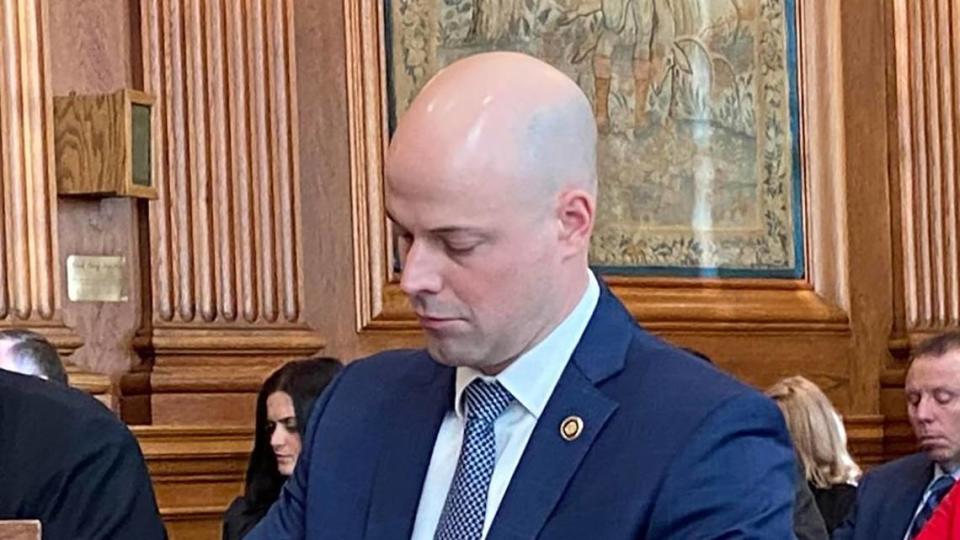Missouri wrongly put him on death row and paid him $14. Even the guilty get more help | Opinion
- Oops!Something went wrong.Please try again later.
Everyday life is a struggle for Joe Amrine, supporters of the Missouri exoneree wrote in a GoFundMe campaign set up to bring attention to his immediate financial needs.
And the 66-year-old Kansas City man, freed from prison in 2003, could use a little help.
“Even after 20 years since his exoneration, Joe continues to face financial hardships,” organizers from Missourians to Abolish the Death Penalty wrote on behalf of Amrine’s fundraiser. “He currently lives without access to water in his house, making everyday life a struggle.”
It’s not as if Amrine has his hand out. But he spent nearly two decades in prison on death row for a murder he did not commit. Let’s just say, since his release from a Missouri penitentiary, staying gainfully employed hasn’t come easy for him.
These days, Amrine cleans restrooms during Royals games at Kauffman Stadium, he told us this week. He earns about $16 per hour. “The most money I’ve ever made in my life,” he said.
On Friday, at the Black Archives of Mid-America in Kansas City, Amrine will celebrate a milestone no one should ever have to commemorate: 20 years of freedom after an erroneous murder conviction was overturned.
He’ll speak at the event — about what, only God knows, Amrine said — and has plenty to say about a justice system that sends innocent people to prison but offers them little to no help reintegrating back into society.
Convicted murderers and other guilty criminals let out of Missouri prisons on parole can collect assistance for food and other social services on the state’s dime, Amrine said.
But for a death row exoneree such as Amrine, and others cleared of wrongdoing, no compensation, job placement or mental health services await.

Gov. Mike Parson vetoed bill from Parkville Republican
In Missouri, only prisoners exonerated by DNA analysis are eligible for post-conviction relief. Think about that: In our state, unless DNA evidence clears them, the wrongfully convicted are released from prison with not so much as an apology.
Need help to get on your feet? Oh well, not our problem, Missouri says. Lost earning potential while behind bars on a bad conviction? Tough luck.
Gov. Mike Parson had an opportunity to right this unconscionable wrong. But earlier this month, he vetoed a criminal justice reform bill that would have expanded opportunities for the state to pay restitution to wrongfully convicted prisoners.
The bill, sponsored by state Sen. Tony Luetkemeyer, a Parkville Republican, wasn’t perfect, advocates for the wrongfully incarcerated said.
If approved, the law would not have applied retroactively to Amrine, anyway. The measure was a start, though. Too bad Parson did not sign off on Senate Bill 189.
Taxpayers around the state should not be responsible for an error made at the local level, Parson argued in rejecting the bill. Last we checked, it was local prosecutors’ job to represent the state’s interest in criminal matters.
Since his release in 2003, financial hardships have come and gone with each lost job opportunity, Amrine said. He is stressed at times, and smokes about two packs of cigarettes per day to help calm himself.
Potential employers are sometimes put off by Amrine’s criminal history. His false murder conviction still shows up on background checks.
“That stuff is still there,” he said. “Tell me that’s not wrong.”
Cleared by State Supreme Court after jailhouse informant lied
Amrine spent 17 years on death row for a murder he did not commit. False testimony — and faulty evidence — from jailhouse snitches almost cost Amrine his life.
By his count, Amrine was on death row with hundreds of inmates between 1986 and 2003, when he was fully exonerated. More than 60 of them were executed, Amrine told us.
“Can you imagine the mental and physical struggle of being on death row?” No, Joe, we can’t.
Two decades have passed since he was absolved of any wrongdoing in the 1985 prison murder of fellow inmate Gary Barber. Amrine, already serving a prison sentence for robbery, burglary and forgery, was convicted of first-degree murder and sentenced to death for killing Barber.
Except he didn’t fatally stab Barber with an ice pick, as three other inmates alleged. Another prisoner did.
Amrine appealed his murder conviction. When the judges of the Missouri Supreme Court found him innocent by clear and convincing evidence, they gave the prosecution 90 days to decide whether to retry him, his attorney Sean O’Brien told us.
Two days later, lab techs said they found blood evidence and DNA extracted from Amrine’s clothing was tested, O’Brien said.
But the results were inconclusive, and as such, precluded Amrine from receiving post-conviction relief from the state.
“We had to prove his innocence the old fashioned way,” O’Brien said. Amrine was freed without any compensation. How is that a just system?
Exonerees often return home with no means of obtaining an ID or driver’s license. They have no credit or work history, and with no experience renting a place to live, finding housing is troublesome, too, advocates said. Many lack transportation.
And that conundrum, through no fault of their own, just isn’t fair to exonerees like Amrine, a father who has seven grandchildren.
As a society, don’t we owe a great deal of debt to Amrine and others who are wrongfully convicted? Not helping them rebuild their lives only prolongs the injustice.

